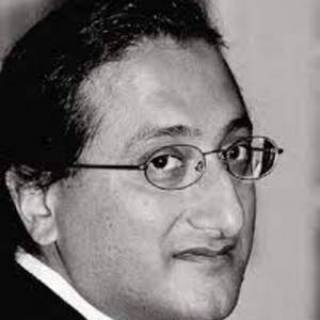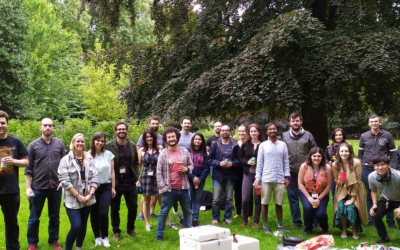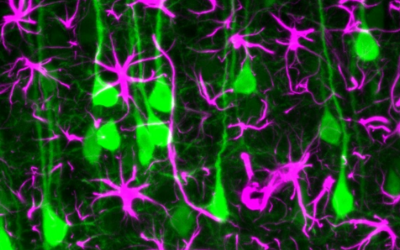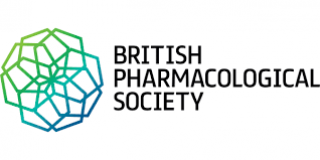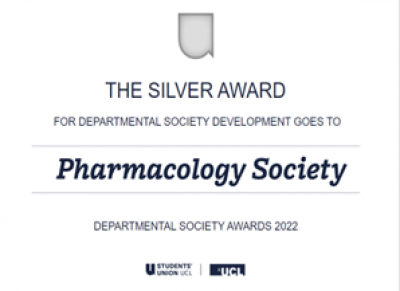Pharmacology degrees
| Programme details | |
|---|---|
| Start date | September |
| UCAS code | BSc Pharmacology B210 |
| Duration | BSc 3 years Full Time |
| Location | UCL Bloomsbury |
Why study Pharmacology at UCL?
In the QS World University Rankings 2023, UCL was ranked number one in London and fourth in the world for the study of Pharmacy and Pharmacology.
UCL retains a strong focus on practical teaching and laboratory skills as well as small group tutorial teaching. From your second year onwards approximately half of your time will be spent either in small group tutorials, in practical classes or in analysing and reporting on the data you recorded in your practicals.
You will have the opportunity to undertake a year in industry, either between year two and three of the BSc programme or year three and four of the MSci programme, spending time in the pharmaceutical industry or another pharmacology-related area. A year in industry allows you to gain practical experience and give you an insight into what area you would like to pursue upon graduation.
We offer a wide range of advanced modules including modules in molecular and receptor pharmacology, neuropharmacology, synaptic, immunopharmacology, psychopharmacology and more.
Join world-class laboratories to pursue your own research. For the BSc this will account for 38% of the year, whilst for the MSci it will account for 50-75% of the year. These research projects provide you with a chance to work as part of a world-leading laboratory, making your own scientific discoveries.
Become part of a great history. Sir James Black, previous professor and head of the department of pharmacology at UCL, was awarded the 1988 Nobel Prize in Physiology or Medicine for his work on β-blockers and histamine H2 receptor antagonists which lead to the development of propranolol and cimetidine, a drug used to treat stomach ulcers. Other titans of UCL’s proud history in pharmacology include Archibald Hill, winner of the Nobel prize in 1922 for physiology or medicine, Heinz Otto Schild whose work led to the development of modern, quantitative pharmacology and John Gaddum, founder member of the British Pharmacology Society, first editor of the British Journal of Pharmacology and discoverer of Substance P, an important molecule in pain.
What is the difference between the BSc and the MSci?
- The BSc is a three year programme whilst the MSci is taken over four years.
- Both programmes are identical in years one and two.
- In year three, BSc students may undertake a small-scale research project. MSci students will undertake a literature review.
In year four, MSci students will be able to choose the lab with which they will work and then collaborate with an existing project, becoming part of a world-leading active laboratory research project. Up to three-quarters of their fourth year is spent in a leading laboratory doing research.
In year two, students on the BSc programme can evaluate their programme choice and apply to change to the MSci, contingent on their marks in the programme to date. Students on the MSci programme must achieve certain results to stay in the programme.
Course structure overview
All years have 120 credits total. Modules are either 15 or 30 credits. Year one consists of five compulsory modules, covering chemistry, biochemistry, cell biology, physiology, statistics and, of course, pharmacology. The first year is thus designed to give you a solid foundation that prepares you for years two and three. This is the same for both BSc and MSci students.
In year two you will have four compulsory modules focussed on pharmacology. There is a major emphasis on laboratory practicals and experimental pharmacology and you will take one large module devoted entirely to this area. In addition to the compulsory elements, you will have a choice for one of your modules in your second year.
In year three, BSc students will undertake a lab-based project and MSci students a literature-based project. All students have one compulsory module and are then able to choose from a wide range of optional modules.
In year four, MSci students will undertake an extended experimental project. Additionally, they will be able to choose from a range of optional modules.
Year one course content
Five compulsory modules are undertaken by all Pharmacology students:
BIOC0001 Biochemistry and Molecular Biology (15 credits)
Leader: Dr Amanda Cain
CELL0007 Cells and Development (15 credits)
Leader: Professor Sandip Patel
CHEM0010 Chemistry for Biology Students (15 credits)
Leader: Professor Andrea Sella
PHAR0002 An Introduction to the Mechanisms of Drug Action (15 credits)
Leader: Dr Guy Moss
PHOL0001 Mammalian Physiology (30 credits)
Leader: Dr Richard Tunwell
Year two course content
Compulsory modules
INIM0005 Immunology (15 credits)
Leader: Dr Milica Vukmanovic-Stejic
PHAR0004 General and Systematic Pharmacology (30 credits)
Leader: Professor Talvinder Sihra
PHAR0006 Experimental Pharmacology (30 credits)
Leader: Professor Mark Farrant
PHOL0005 Structure and Function of Nervous Systems (15 credits)
Leader: Dr Damian Cummings
Optional modules
Students will need to choose minimum of 15 and maximum of 30 credits:
One of
BIOC0006 Essential Protein Structure and Function (15 credits)
Leader: Professor Stephen Perkins
OR
BIOC0007 Essential Molecular Biology (15 credits)
Leader: Dr Eleni Makrinou
Students will need to choose minimum of 0 and maximum of 15 credits
NEUR0007 Cellular Neurophysiology
Leader: Dr Martin Stocker
ANAT0002 Developmental Neurobiology
Leader: Professor Patricia Salinas
CHEM0023 Chemistry of Biologically Important Molecules
Leader: Professor Stefan Howorka
Year three course content
BSc Pharmacology
Compulsory
PHAR0011 Molecular Pharmacology (15 credits)
Leader: Professor Alasdair Gibb
Students will need to choose minimum of 30 and maximum of 45 credits
PHAR0016 Advanced Investigative Project in Pharmacology (30 credits)
Leader: Professor Talvinder Sihra
PHAR0017 Advanced Research Project in Pharmacology (45 credits)
Leader: Professor Talvinder Sihra
MSci Pharmacology
Compulsory
PHAR0016 Advanced Investigative Project in Pharmacology (30 credits)
Leader: Professor Talvinder Sihra
PHAR0011 Molecular Pharmacology (15 credits)
Leader: Professor Alasdair Gibb
Students in both programmes can then choose from a large range of optional modules
Pharmacology focussed modules
- BSc Students will need to choose minimum of 0 and maximum of 90 credits
- MSci Students will need to choose minimum of 45 and maximum of 75 credits
PHAR0010 Neuropharamcology (15 credits)
Leader: Dr Stephanie Koch
PHAR0012 Receptor Mechanisms (15 credits)
Leader: Professor Alasdair Gibb
PHAR0013 Pharmacology of Inflammation (Extended) (30 credits)
Leader: Dr Dean Willis
PHAR0014 Drug Design and Development (15 credits)
Leader: Dr Dean Willis
PHAR0015 Psychopharmacology (15 credits)
Leader: Professor Neil Millar
PHAR0018 Synaptic Pharmacology (15 credits)
Leader: Professor Talvinder Sihra
PHAR0019 Pharmacology of Inflammation (15 credits)
Leader: Dr Dean Willis
PHAR0024 Toxicology (15 credits)
Leader: Dr Joanna Edwards
Broader module examples (a full list of available modules will be provided to students on the programme)
- BSc students will need to choose minimum of 0 and maximum of 90 credits
- MSci students will need to choose minimum of 0 and maximum of 30 credits
BIOL0020 Sex, Genes and Evolution (15 credits)
Leader: Professor Andrew Pomiankowski
BIOC0017 Cancer Biology (15 credits)
Leader: Professor Matilda Katan-Muller
ANAT0013 Pain (15 credits)
Leader: Dr Sandrine Geranton
ANAT0008 Neurodegenerative Diseases (15 credits)
Leader: Professor Stephen Davies
NEUR0009 Metabolic Neuroscience (15 credits)
Leader: Professor Stefan Trapp
NEUR0014 Neural Basis of Learning/Motivation (15 credits)
Leader: Professor Francesca Cacucci
NEUR0015 Control of Movement (15 credits)
Leader: Professor Christopher Yeo
NEUR0016 Neural Computation (15 credits)
Leader: Professor Neil Burgess
Year four course content (MSci only)
Students will need to choose minimum of 60 and maximum of 90 credits:
PHAR0023 MSci Extended Research Project in Pharmacology (90 credits)
Leader: Professor Talvinder Sihra
PHAR0001 MSci Research Project in Pharmacology (60 credits)
Leader: Professor Talvinder Sihra
Pharmacology focussed modules
MSci Students will need to choose minimum of 30 and maximum of 60 credits
PHAR0010 Neuropharamcology (15 credits)
Leader: Dr Stephanie Koch
PHAR0012 Receptor Mechanisms (15 credits)
Leader: Professor Alasdair Gibb
PHAR0013 Pharmacology of Inflammation (Extended) (30 credits)
Leader: Dr Dean Willis
PHAR0014 Drug Design and Development (15 credits)
Leader: Dr Dean Willis
PHAR0015 Psychopharmacology (15 credits)
Leader: Professor Neil Millar
PHAR0018 Synaptic Pharmacology (15 credits)
Leader: Professor Talvinder Sihra
PHAR0019 Pharmacology of Inflammation (15 credits)
Leader: Dr Dean Willis
PHAR0024 Toxicology (15 credits)
Leader: Dr Joanna Edwards
Broader module examples (a full list of available modules will be provided to students on the programme)
MSci students will need to choose minimum of 0 and maximum of 30 credits
BIOL0020 Sex, Genes and Evolution (15 credits)
Leader: Professor Andrew Pomiankowski
BIOC0017 Cancer Biology (15 credits)
Leader: Professor Matilda Katan-Muller
ANAT0013 Pain (15 credits)
Leader: Dr Sandrine Geranton
ANAT0008 Neurodegenerative Diseases (15 credits)
Leader: Professor Stephen Davies
NEUR0009 Metabolic Neuroscience (15 credits)
Leader: Professor Stefan Trapp
NEUR0014 Neural Basis of Learning/Motivation (15 credits)
Leader: Professor Francesca Cacucci
NEUR0015 Control of Movement (15 credits)
Leader: Professor Christopher Yeo
NEUR0016 Neural Computation (15 credits)
Leader: Professor Neil Burgess
Our latest research
Molecular and Cellular Neuroscience
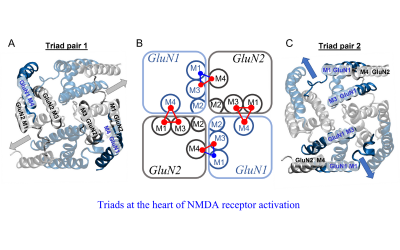
Epithelial Physiology
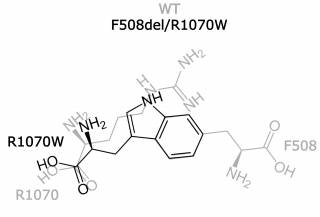
Circuits and Systems Neuroscience
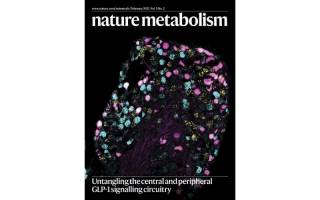
Central and peripheral GLP-1 systems independently suppress eating
Careers
80% of our graduates are in work or further study 15 months after employment (Graduate Outcomes 2019-2021). Our alumni can be found in areas including health and social care, manufacturing, research, policy and government. Companies that have employed our graduates in recent years include Novartis, the UK government, UK Biocentre, the NHS and many more. Some of our graduates also hold senior academic positions at other universities.
In addition to pharmacology, we focus on teaching our students highly sought-after transferable skills from the first week of the programme. These include teamwork, problem-solving, critical thinking/evaluation, data literacy, analysis and visualisation, literacy, scientific reading, presentation training, written/verbal communication, IT skills and more. In addition to the development of these skills within the formal structure of the programme, UCL provides many opportunities for students to practice these skills in other environments. These include summer internships, our student societies, the Changemakers programme and our entrepreneurship/start-up programmes. In addition to being enjoyable and educational, these opportunities provide students with examples of their abilities in the key skills sought by employers for their CV and to use in job interviews. These are the examples that can clearly differentiate recent graduates from the rest of the crowd and assist them in landing their first major career role.
Find out more about our graduate employability and earnings statistics at Discover Uni.
Useful careers resources:
My UCL Careers
UCL Neuroscience Careers Network
Professional Development Courses
Linked In Learning
Public Engagement Training
Public Policy Training
Interested in start-ups?
Many of our pharmacology students are interested in start-ups, social enterprises and developing entrepreneurial skills. UCL's Innovation and Enterprise division offers training, start-up grants, competitions, communities and much more, all of which are free to students on this programme.
UCL's entrepreneurship community has supported over 300 UCL start-ups since 2010 and raised over £280 million in investment.
Find out More
For information on entry requirements, fees, how to apply and much more visit the BSc Pharmacology Prospectus Page or MSci Pharmacology Prospectus Page.
 Close
Close



